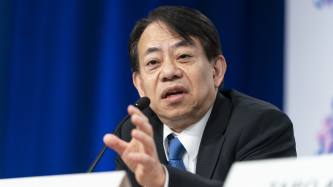As the financial crisis that began in the US and Europe has spread out into the greater global economy, it has taken an increasingly distressing toll on Asia as of late last year. In the process, it has allowed the Asian Development Bank (ADB) to rediscover its role in the region. The ADB is now back in the limelight and being courted by its shareholder and borrower nations alike - both for its unique supranational credentials and the increased funds at its disposal.
Wake-up call
Less than two years ago, Asia's fast-growing savings, foreign exchange reserves and access to capital were threatening to make its only local supranational bank irrelevant. However, Asia's economies have taken quite a hit in recent months - not just in short-term cyclical terms, but also in a profound, radical questioning of many widely held assumptions about their export-driven models. The wake-up call that the region's leaders have faced has sparked an unlikely, and perhaps unprecedented, consensus of the need to provide investment and social support for their domestic economies and achieve better integration within the region.
That was all reflected at the beginning of May when the ADB held its 42nd annual meeting in Bali. It celebrated a massive ramping up of its long-term capital, a fresh commitment to disburse shorter-term funds where they are most needed, and a reinvigorated mandate to co-ordinate the region's fightback against an economic downturn that is threatening to become a social crisis.
"It went extremely well," says Rajat Nag, managing director-general of the ADB. "The shareholders approved a tripling of our capital, so naturally we're celebrating. There was a good feeling from them that we'd done well and what we are doing is good. But the mood was also sombre - a recognition that the crisis is much more severe in Asia than a few months ago. There was a lot of talk of what can be done and what ADB was going to do."
With all 69 shareholders approving the boosting of its capital base from $55bn to $165bn, the ADB has $10bn in additional funds to spend over the next year. Of that figure, $3bn will be pumped into the worst-affected countries in the form of fiscal support, and $1bn has been earmarked for trade financing facilities.
This larger back-stop funding potential, and speedier disbursements to poorer countries, should, in turn, help to bolster the confidence of Asian governments to pursue expansionary policies. Even with the increase in capital, there is a limit to what the ADB can do alone, says Mr Nag. Slower Asian growth because of the economic crisis will prevent 60 million people from escaping poverty this year and a further 40 million in 2010 (putting 100 million more people below the poverty line than would have been had growth continued at 2007 rates). The ADB expects an average growth rate in developing Asia this year of 3.4% and 6% in 2010, compared with last year's 6.3% and the 9.5% in 2007.
Bolstering infrastructure
That capital increase also comes with extra responsibility. The ADB has been charged with leading co-ordination and integration across the diverse region in promoting physical infrastructure, both national and intra-Asian, and finding better ways to channel Asia's prodigious savings into better-yielding investment that stays in the region. It will also play a more active lending role itself, on its own account and with the private sector, just as frayed Asian economies are becoming the subject of huge stimulus plans that require immediate funding.
"There is a very serious social crisis in the making," warns Mr Nag. "The economic crisis in Asia has many important social implications that could lead to instability. Governments cannot diminish social expenditure. But at the same time they need to improve their physical infrastructure - that leaves the ADB to pick up the slack."
He continues: "The political leadership are aware of the social repercussions. They may be in a good position on both the fiscal and monetary side, but, except for China, most don't have much to spare. That's why we have the capital increases and plan to boost lending by 50% over the next year. Where it will go depends on the needs of the country - those with less fiscal space and more social challenges."
The ADB will have to be proactive and quick in its decision-making while keeping its long-term development goals focused and transparent - not things that the bank has always found easy to do. It will also have to wrap an inclusive arm around some distinctly different shareholder nations, as well as non-government organisations and private sector co-workers.
As would be expected, the ADB has critics on all sides. Non-governmental organisations complain about quasi-commercial bank lending that sees poorer countries fall into debt traps, corruption and lack of transparency in major projects and environmental damage, especially in its energy policy. Their protester wing was kept well away from the May meeting in a self-contained five-star resort complex in Nusa Dua, Bali (though so were potential terrorists that have done such harm to Bali twice in the past few years). It certainly made a strange venue for discussing poverty, the environment and working together to promote regional trade as each country jostled for their piece of the pie.
Controversial priorities
The US - the largest shareholder in the ADB along with Japan - has come forward as an unlikely ally on some issues. It sent a low-level representative, but has often been critical of the ADB, especially about aid to countries that are becoming an increasing threat to its own economic interests rather than poorer, weaker countries.
Senator Richard Lugar, the top Republican on the Senate foreign relations committee, for example, has asked the US Treasury whether an increase in funding was appropriate given the global economic crisis. He said: "In light of the fact that nearly 50% of the ADB's regular lending in 2008 went to India and China, two fast-growing countries with access to private capital markets, one must ask whether the bank could do more with its current lending authority if it concentrated on its mission of poverty reduction in the least developed countries."
ADB's Mr Nag refutes this assertion: "China and India have larger numbers of poor. If we make a dent in that [we reduce the number of poor people in the region]. ADB lends to India but they are non-concessionary funds, unlike the soft loans that the World Bank extends. And we are not increasing our funds to China but we will continue operations."
Not that China and India are dancing cheek to cheek either. China has criticised an ADB loan to a contested region of northeastern India. But then China has been flexing its muscles for all to see. Recent statements about the demise of the US dollar and worries about US investments in general have been followed by a call for its voice in the ADB to be increased, hinting that it can do its own thing in the region anyway - that it is a lender as well as a borrower. A good example of this - but also of how the two can work together - came in Bali when ADB and China Exim inked a $3bn deal that will co-fund infrastructure projects in the region.
Then, of course, there is the Japanese, who have traditionally run the ADB and long-wanted to use it a catalyst for an Asian currency (which is presumed to be the yen, though in the past year China has been more vocal in joining the US in disabusing them of that notion). "There is nothing like a global crisis to give relevance to multilateral organisations," wrote Philip Bowring, one of Asia's most respected columnists. "And nothing like China-Japan rivalry to breathe life - or at least money - into Asian regional co-operation."
Extra capital
Indeed, on the edge of the Bali meeting, the 10 members of the Association of South East Asian Nations and China, Japan and South Korea (known as the Asean-Plus-3 Group) agreed on the creation of a $120bn currency pool - China and Japan will both contribute $38.4bn - for poorer nations in need. The ADB will play a key role in administering this fund. It also plans to build on its role in developing regional bond markets. This will be done via a corporate bond guarantee scheme. At the same time, it will continue to issue bonds itself in Asian currencies. This complements the ADB's attempts to promote pan-Asian infrastructure.
For all the criticism and complaints that would be expected of such a broad institution, there is little doubt that the ADB is moving more or less in one direction - certainly more than it has done for years. Sri Mulyani Indrawati, finance minister of the meeting's host nation, Indonesia, summed it up for many, when she said the main outcomes of the summit were the ADB's increased capacity and ability to respond to the crisis, with the help of better policy co-ordination between its members.












